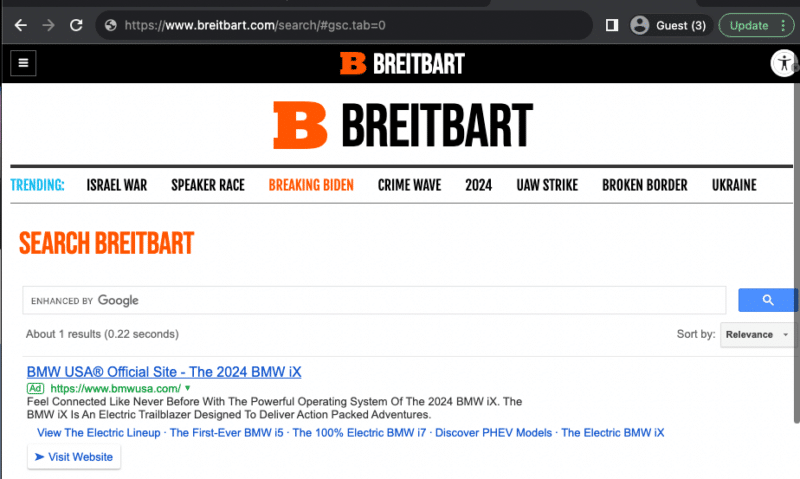Google Ads exec Jerry Dischler has stepped down after more than 15 years to take on a new challenge.
The tech giant was not able to disclose what the “new challenge” is or whether he would remain within the business, but did tell Search Engine Land that the decision was not related to the recent federal antitrust trial.
After more than a decade working in advertising, Google explained it was only natural for Dischler to want to try something new.
Takeover. Vidhya Srinivasan, who previously led product and engineering for ads, will take over to lead the Ads team and will report directly to Google’s Senior Vice President, Prabhakar Raghavan.
Shashi Thakur, who has worked for Google for 17 years, will take on Srinivasan’s previous role and report directly to her, covering ads for Google’s core business.
Official statement. Google’s Vice President, Raghavan, said in a statement:
- “After more than 15 years on Google’s ads business, Jerry Dischler decided to take on a new challenge.”
- “Our ads business helps millions of businesses thrive and we’re grateful to Jerry for his many accomplishments in this area. We’re also excited to elevate Vidhya Srinivasan, a seasoned leader with deep technical expertise who currently leads our search ads business, to lead Ads.”
- “With a track record of significant innovations across privacy, measurement, AI, search ads and beyond, Vidhya is the natural successor for this role.”
New Google Ads boss. Srinivasan, who joined Google from Amazon four years ago, has overseen technical teams across various aspects of the ads product portfolio. This includes roles related to search and shopping ads, Google Analytics, ads measurement tools, and AI-powered campaign experiences. During her tenure, she led the launch of Performance Max and Demand Gen, the overhaul of Google Analytics, and the implementation of pixel-less measurement for YouTube advertising.
Recently, she has been at the forefront of Google’s efforts to monetize new generative AI experiences in Search (SGE) and has been instrumental in developing tools for advertisers to utilize generative AI capabilities for campaign and asset creation. Beyond her technical contributions, Srinivasan sponsors Google’s Women in Ads Community, focusing on empowering self-identified women in Ads and supporting their career advancement.
Stepping up. Long-term Googler Shashi, who has been with the company for 17 years, has contributed significantly to the development of core Google products such as Search, Discover, and Shopping. His extensive tenure includes recent work on long-term strategy within Prabhakar’s Knowledge and Information organization.
Over 13 years focused on Google Search, Shashi played a vital role in evolving the search experience, particularly with the advent of mobile devices. Notably, he led engineering and product teams that introduced the Google Knowledge Graph to enhance the Search experience.
Shashi also served as the General Manager for Consumer Shopping, overseeing the development of the shopping experience on Search. In this role, he emphasized creating more inspirational experiences through conversational AI and AR/3D technology.
Dischler’s leadership. During his time in Ads, Dischler played a crucial role in shaping the future of advertising for Google and the industry overall. He contributed to Google’s transition from desktop to mobile, established a leading stance on user privacy, and pioneered advanced advertising technologies, including early applications of machine learning (ML) and artificial intelligence (AI) at scale.
He began overseeing Google Ads in 2020 and achieved record-breaking profits. In the first three quarters of 2023 alone, the search engine made more than $220 billion in ad revenue under Dischler’s leadership.
Antitrust trial comments. During the federal antitrust trial, Dischler testified that Google changes the auctions it uses to sell search ads, increasing the cost of ads and reserve pricing by as much as 5% for the average advertiser. He claimed that for some queries, the tech giant may have even raised prices by as much as 10%. He added that for some queries, the tech giant may have even raised prices by as much as 10% – but Google tends “not to tell advertisers about pricing changes.”
Following Dischler’s comments, a Google spokesperson told Search Engine Land:
- “Search ads costs are the result of a real-time auction where advertisers never pay more than their maximum bid. We’re constantly launching improvements designed to make ads better for both advertisers and users.”
- “Our quality improvements help eliminate irrelevant ads, improve relevance, drive greater advertiser value, and deliver high quality user experiences.”
Deep dive. Read our blog on the federal antitrust trial for more information on Dischler’s testimony.
from Search Engine Land https://ift.tt/Otg1NVp
via https://ift.tt/4G9qKO8 https://ift.tt/Otg1NVp








 (@gsterling)
(@gsterling)